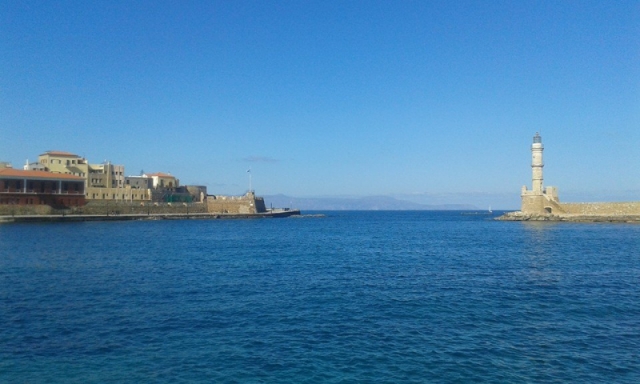Press here.
Prefecture: Chania

Places near Agios Charalambos Lentariana
The prefecture of Chania covers the western section of the island. The prefecture is known as beautiful and mostly unspoilt part of the island. It has an area of 2,376 square km and approximately 134,000 residents, the second largest population in Crete, after Heraklion. Chania is subdivided into five provinces: Kydonia, Kissamos, Apokoronas, Selino, and Sfakia. The main cities of the prefecture are Chania, the capital, and Kastelli in Kissamos. The main towns are Paleohora and Kandanos in Selino, and Hora Sfakion in Sfakia. The prefecture of Chania offers a wide variety of tourist services and activities of all classes and types. The city of Chania has also maintained characteristics of the Venetian era. The Lefka Ori rise behind Chania and drop to the Libyan Sea in Sfakia and contain many gorges and canyons for the nature or hiking enthusiast. The sandy beaches and clear waters of Falasarna, Paleohora and Georgioupolis offer pleasant swims. The Minoan, Roman, Byzantine, Venetian and Turkish archaeological sites attract those seeking cultural and historical information. The province of Kissamos in the northwest of the prefecture of Chania lies between the two peninsulas of western Crete. It extends west to the sea and south to Elafonisi Island. Kastelli is the main city of this area. The city has a variety of tourist services. On the coastal road from Kastelli to Elafonisi Island you can see the wild beauty of western Crete. The beaches at Elafonisi, Falasarna, and Gramvousa are among the finest in Crete. The many Byzantine and Venetian churches, as well as the ancient cities of Polirinia and Falasarna, may be of interest to tourists. The peninsulas of Gramvousa and Spatha are mostly inaccessible by car. Hikers can enjoy some parts. The province of Sfakia occupies the southeast area of the prefecture of Chania. The Lefka Ori cover most of the area. The province includes the plateaus of Krapi, Askifou, Niatos, Anopolis, Aradena, and Kalikratis. Sfakia has the highest peaks of the Lefka Ori: Pahnes (2,450m); Kastro (2,218m), and Troharis (2,409m). This wild terrain is one of the most impressive in Crete. The visitor may enjoy the panoramic view going from Chania to Sfakia by road. Very impressive also is the Samaria Gorge excursion and the subsequent boat trip to Hora Sfakion. There are many interesting things for a visitor in the area of Sfakia. The beaches near Loutro, Agia Roumeli, and Frangokastello offer the clear waters of the Libyan Sea. The Byzantine churches of Agios Pavlos (in Agia Roumeli), Michael Archangelos (Aradena), Agii Apostoli (Hora Sfakion), and the Panagia Thymiani and Agios Georgios (Komitades) are of cultural interest. The ravines and gorges through Samaria, Aradena, Imbros, and Kalikratis afford excellent hiking opportunities. The mountain hike to the refuge and plateau at Niatos, 1,500 metres above Askifou, may interest the visitor. With more than 40 peaks above 2,000 metres, the Lefka Ori offer numerous superb hiking possibilities. The province of Selino is in the southwest part of Crete. It borders the Libyan Sea and the south side of the Lefka Ori. The two major towns are the capital, Kandanos, and Paleohora on the south coast. The name of Selino is derived from the Venetian castle, Selino, in Paleohora. Near Kandanos there are many interesting Byzantine churches. The town of Chania, which is also the prefecture's capital, has obtained a great reputation throughout history. Walking on narrow streets of the Old Town you taste the historical atmosphere, meeting the ornaments of Chania, the Venetian harbour and castle . The old town is also the centre of night life. While visiting Chania, you have the chance to visit many archaeological sites which still bring memories of the foreign occupation. Arabs, Venetians and Turks left their marks in the town of Chania. You will be really enchanted by its picturesque houses, churches and its special architecture. Furthermore, the prefecture of Chania has the greatest beaches in Crete! Sandy beaches getting wet by the crystal light-blue waters of Libyan Sea creating an unforgettable landscape. The islets and the mountainous villages give an exotic image to this part of Crete! If you love unspoiled beautiful nature, you should visit the famous Samaria gorge or the steep mountains of Chania, called White Mountains . Chania is the ideal vacations destination. Luxury hotels, villas or apartments are waiting for you so as to experience what you will never forget!
Along the famous waterfront there are built numerous cafes, bars and a few traditional tavernas with wonderful views to the sea and a part of the Venetian Walls. The locals usually prefer this part of the waterfront to have a coffee in the evening or a first drink during the night.
The history of Kum Kapi starts during the last years of the Turkish occupation when the Arabs grew "Halikoutes", a small village, near a sandy beach and next to the Venetian fortifications. This district was called in Turkish "Kum Kapisi" (meaning Gate of the Sand) because of the Venetian Gate built there.
If you want to have a coffee in the Kum Kapi waterfront you can try the following cafe-bars; Elliniko at the start, Thema at the centre, Il Nostro at the end, and the rock-cafe Other Side near the end. There are also many choices for food like the first two restaurants at the start of the waterfront (O Aswtos Yios, Diachroniko) or the restaurant next to the Thema.
The area of Kum Kapi is quite near the old Venetian Town so that you can walk to get from the one place to the other. While walking , if you follow the seafront, you will meet more seafood restaurants (try the Dinos Restaurant) and cafes (try the Dio Lux).
The fatherly house of Eleftherios Venizelos in Halepa of Chania, which constituted his house for more than thirty years, from 1880 to 1910 and later for short periods from 1927 to 1935, today constitutes a Museum under the responsibility of “National Institution of Researches and Studies El. Venizelos”, in which it has been granted by the Greek state.
The collection of the Museum consists of the complete household effects of the ethnarch, which he personally selected, from works of art, part of his library, his personal objects and from the collection of objects and records of Institution, relative to the period, the action and the personality of Venizelos. Characteristic is also that all the areas of the residence have maintained their authentic form until today, the one that they had during the period that El. Benizelos lived at the house.
The Residence of Baroness Von Schwartz in Chania: The exquisitely designed residence of the Baroness Von Schwartz is one of the finest samples of the neoclassical architectural style of Chania. It was built in 1860 and from 1865 till the end of the Turkish occupation, it was a social and philanthropic centre. This magnificent residence is located in the suburb of Chalepa and has turned into a prominent cultural landmark of Chania Town. The sheer elegance of this residence immediately draws the attention of visitors. The marble steps and the porch are truly fine pieces of craftsmanship. The residence is today uninhabited but still well-preserved by the local government.






